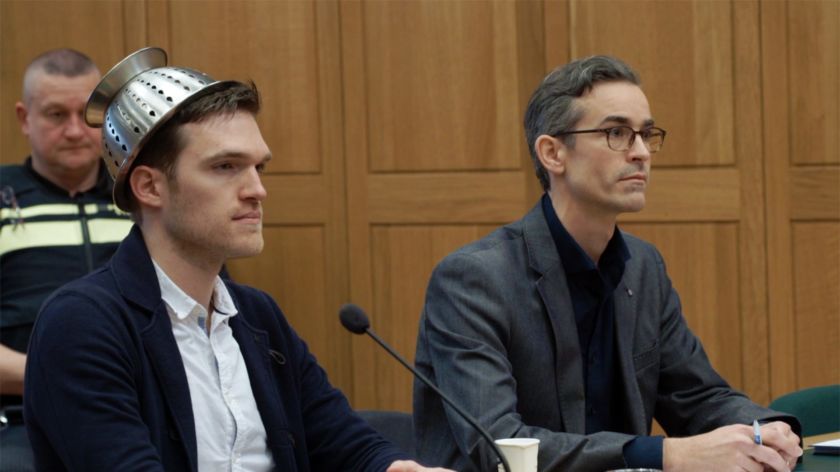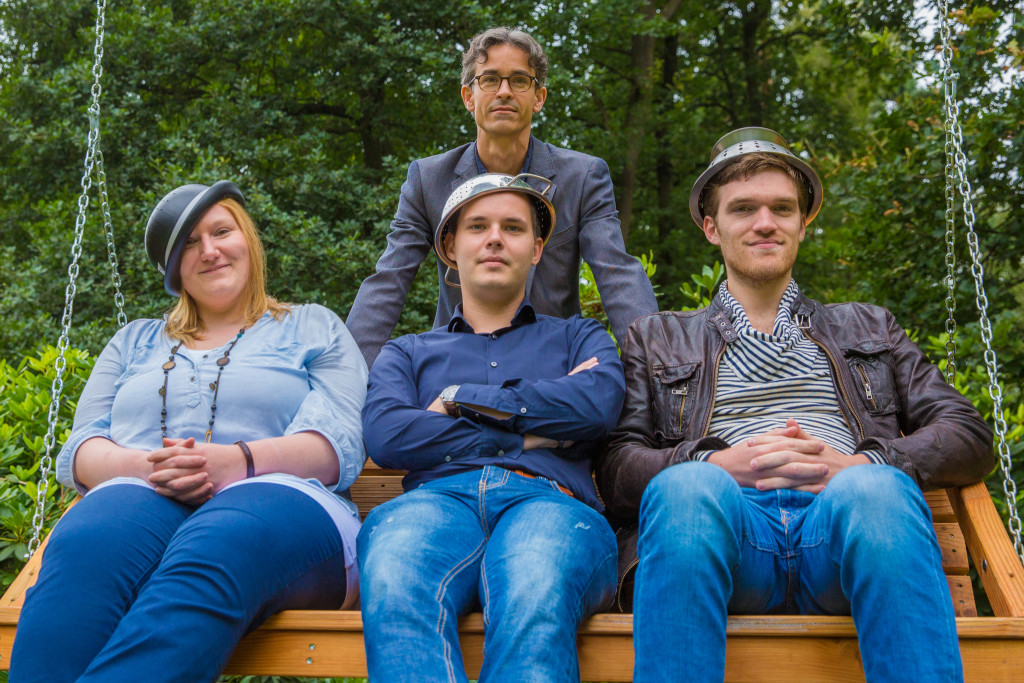Lawyers from Nijmegen in American film about Flying Spaghetti Monster
-
 Derk Venema (right) during the court case involving Pastafarian Mathé Coolen. Photo: private
Derk Venema (right) during the court case involving Pastafarian Mathé Coolen. Photo: private
The documentary 'I pastafari' premiered this week in the United States. In addition to people with a colander on their heads, scientists without colanders were interviewed. One of those is Philosopher of Law Derk Venema. 'I hope that the film stimulates discussion. What is religion?'
Derk Venema isn’t surprised by colanders. For the past few years he has been helping Dutch students who are Pastafarians to get their driving licence photo taken with a colander on their head. As their authorised representative, he pleads their case at trials. He represented the Nijmegen law student Mienke de Wilde when that case was taken to the Council of States. An application to hear this case has been submitted to the European Court of Human Rights. ‘I never hesitated about working on this film,’ he said. ‘I fully support the ideals of the Church of the Flying Spaghetti Monster.’
His Noodliness
His view isn’t the obvious one. There are more than enough lawyers who think that time should be spent on more serious cases. And that a judge has other things to do with their time than listen to jokers who claim to be followers of His Noodliness.
Legal philosopher Venema takes a different view. ‘It’s about fundamental questions. What is religion? Who defines that? How do they define it? Is it even necessary for a religion to first be recognised as such before it can claim certain rights? And is it a good idea to grant citizens separate rights based on that religion?’
‘Apparently you’re allowed to say nasty things about other groups just because you believe in a religion’
Let’s go back to the beginning. About four years ago Derk Venema was working as a lecturer at the Law Faculty in Nijmegen. The Church of the Flying Spaghetti Monster, which was starting to grow in the Netherlands, immediately appealed to him. Venema had long wondered why it’s legitimate to hide behind your religion when you insult homos, for example. ‘As if you yourself aren’t responsible. Just state “that’s what my religion says” and you’re met with a certain amount of acceptance and respect. Apparently you’re allowed to say nasty things about other groups just because you believe in a religion.’
The Church of the Flying Spaghetti Monster challenges this position: if we don’t believe in God or Allah but rather in a spaghetti monster, who has the right to tell us that we aren’t true believers who should enjoy certain privileges?
Unorthodox things
Venema gave legal advice to the students in their legal battle for recognition. And when he was asked to work on a documentary by the American film maker Mike Arthur, he wholeheartedly agreed. Venema is no longer a staff member at the Law Faculty, but is studying at the Radboud Docenten Academie to become a German teacher. He also teaches at a secondary school.

He said that acting in the documentary was easier now that he no longer works at the university. ‘What is so good about a university is that various people work on research together to gain insight. On the other hand, that context can be a sort of brake when you want to do unorthodox things. You wonder if you’re offending people and you have to consider colleagues who think it’s all nonsense. When I left the university, I felt much freer.’
He’s now Derk Venema, and no longer Derk Venema of Radboud University. In the film he explains why he thinks that it’s discriminatory not to give Pastafarians the same rights as other believers. If a headscarf or a turban is allowed on a passport photo for an official document, the same rules should apply to a colander. The legal philosopher thinks that a judge shouldn’t determine whether or not a religion is a “real” religion or satire. ‘I hope that the film will stimulate discussion.’
Article 23
Venema says that the theme is and will remain a topical one. ‘When the newspapers report that things are evidently not going so well at some Islamic schools – Haga, for example – people suddenly begin to wonder why those schools should even exist. It’s because we have Article 23 in our constitution: you are allowed to establish a school on the basis of your own religious principles. But you can indeed ask yourself if that’s at all sensible. If the government financially supports educational institutions, I think that should be separate from religion.’
The documentary premiered last week at the film festival in Nashville. Rather surprising because in that same Nashville the controversial Nashville Statement was drawn up in 2017. That document states, for example, that, based on their faith, a good Christian should always denounce homosexuality. It is exactly this reasoning that the Church of the Flying Spaghetti Monster is challenging.
The film I Pastafari will be shown at various film festivals in American this year. Creator Mike Arthur hopes that it will also be shown in Europe. In addition to Derk Venema, the lawyer and professor from Nijmegen Roel Schutgens also takes part in the film. The camera follows law student Mienke de Wilde during the court case in which she fought for recognition for her religion and the right to wear her colander.



